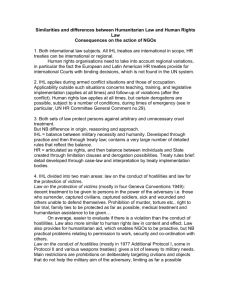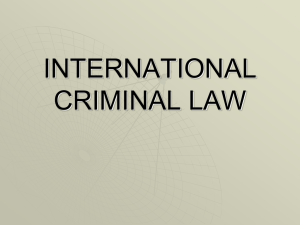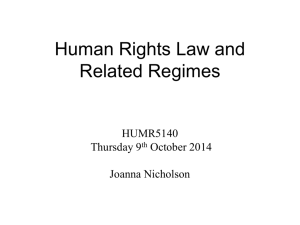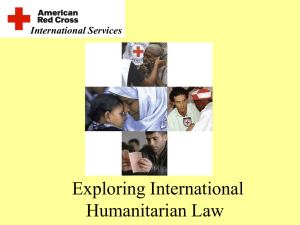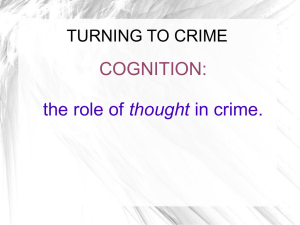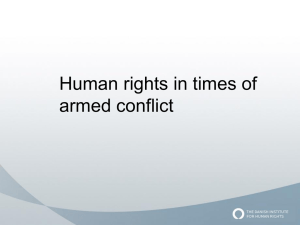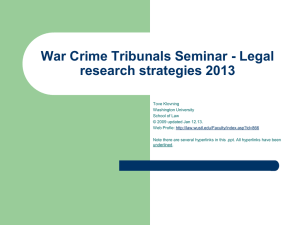Domestication Implementation of IHL Treaties/ICC Rome Statute in
advertisement
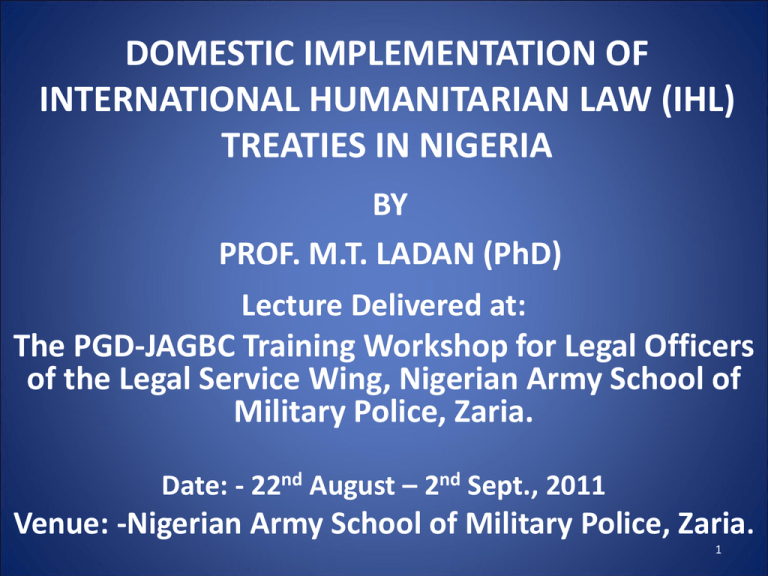
DOMESTIC IMPLEMENTATION OF INTERNATIONAL HUMANITARIAN LAW (IHL) TREATIES IN NIGERIA BY PROF. M.T. LADAN (PhD) Lecture Delivered at: The PGD-JAGBC Training Workshop for Legal Officers of the Legal Service Wing, Nigerian Army School of Military Police, Zaria. Date: - 22nd August – 2nd Sept., 2011 Venue: -Nigerian Army School of Military Police, Zaria. 1 Aim and Objectives of the Paper This paper aims at realizing the following objectives:• To provide responses to the What, the Why and the How of Domestic Implementation of IHL Treaties; • To introduce participants to the acceptable international practice or methods of incorporating treaties into Nigerian Domestic Law; • To engage participants in an interactive session on the viable options for Nigeria. 2 INTERNATIONAL HUMANITARIAN LAW (IHL)/ LAW OF ARMED CONFLICT IHL is a branch of public international law that aims at regulating the conduct of warfare by: – Providing a code of conduct and behaviour for armed forces of a state or party to a conflict; Prohibiting certain means of warfare: - – • • • Means of combat must be chosen to avoid civilian casualties and damage by distinguishing between combatants and civilian objects; Use of weapons to cause widespread, long term and severe damage to the natural environment etc; Use of specific weapons that are poisonous, of mass destruction (WMD), land mines etc. 3 International Humanitarian Law (IHL)/ Law of Armed Conflict (Cont’d) – Prohibiting certain methods of warfare: • Starvation of civilian population by attacking/destroying any object that is indispensable for their survival; • Rape of women and girls of the enemy state; • Threats of violence to civilian population; • To order that there will be no survivors. • Improper user of signs, and emblems of the Red Cross/crescent; – Prohibiting 2 things in the organisation of armed forces: • Recruitment of under 15 years; • Compelling enemy nationals to fight against their own state. 4 International Humanitarian Law (IHL)/ Law of Armed Conflict (Cont’d) – – Providing for the protection of human rights of individuals and groups that are civil in nature and relevant to human life and dignity in armed conflict situation: i. By the 4 Geneva Conventions, the 1977 Additional Protocols and the Hague Convention prohibiting the killing or violence to the life of all protected persons such as prisoners of war, the wounded, sick, shipwrecked, civilian persons, surrendered or disarmed or defenceless enemy soldier; ii. By prohibiting indiscriminate attacks, torture, inhuman and degrading treatment or punishment of all protected persons in their lawful custody; etc. Providing measures for the prevention and control of armed conflict as well as post-conflict measures (such as search for the wounded, sick, dead; repatriation of prisoners of war to neutralized zones; disciplinary measures/penal sanctions for breaches of IHL). 5 International Humanitarian Law (IHL)/ Law of Armed Conflict (Cont’d) – Hence IHL is of 3 types and purposes: • • • – The Geneva type law ( the 4 Geneva Conventions) is purely humanitarian in nature and protective of war victims in purpose; The Hague type law (Hague Conventions) is basically about legal regulation of conduct of hostilities; The mixed type law (Additional Protocols to the G.C., 1977) deals with both the protection of victims of war and operational code of conduct. Finally, the message of IHL is very clear that even in armed conflict situations there must be respect for legal restraints and the need to balance the military necessity to attack with the protection of noncombatants/victims of war. 6 INTERNATIONAL CRIMINAL LAW (ICL) ICL is that branch of Public International Law that deals with the administration of international criminal justice by providing for penal consequences for committing international crimes and guaranteeing procedural safeguards to all accused persons. In addition to a body of existing treaties and case law developed by the Nuremberg and Tokyo Tribunals, the International Criminal Tribunals for the former Yugoslavia and Rwanda, and the UN special Court for Sierra-Leone, the international community reached an historic milestone on 17 July 1998, when 120 states adopted the Rome Statute as the legal basis for establishing the permanent International Criminal Court. The Rome Statute entered into force on 1st July 2002. ICC’s seat is at The Hague in the Netherlands. • Why the International Criminal Court (ICC)? – The international community has long needed a treaty-based, representative, permanent, and independent court, not part of the UN 7 system; INTERNATIONAL CRIMINAL LAW (ICL) (Cont’d) – In order to achieve the following: I. II. To administer international criminal law and justice; To end the culture of impunity by perpetrators of serious international crimes; III. To effectively protect human rights and efficiently uphold the rule of law. • ICC’s Jurisdiction under Rome Statute: I. Over serious international crimes clearly defined in the Rome Statute and other relevant instruments namely, genocide, crimes against humanity and war crimes. II. Over persons (not states or governments) where such crimes were committed on a State Party’s territory or by one of its nationals; III. The 2 conditions under item ii above do not apply if a situation is referred to the prosecutor by the UN Security Council, whose resolutions are binding on all UN Member States, and if a state makes a declaration accepting the jurisdiction of the ICC. IV. ICC will also have jurisdiction over the crime of aggression once a consensus definition is arrived at by the Assembly of States Parties. 8 INTERNATIONAL CRIMINAL LAW (ICL) (Cont’d) • Fundamental Principles of the Rome Statute: – Complementarity principle: - The Court is intended to complement, not to replace, national criminal justice system. It can prosecute cases only if national criminal justice systems do not carry out proceedings or when they claim to do so but in reality are unwilling or unable to carry out such proceedings genuinely. – Cooperation Principle: - States Parties (now 105) are obliged to cooperate with the ICC in the investigation and prosecution of crimes, including the arrest and surrender of suspects. – No immunity from arrest, investigation, prosecution, criminal responsibility to any Head of State, or government official or any public officer acting in an official capacity. NB: - Cases of Pinochet and Charles Taylor, Ethiopian Court convicted ex-dictator Mengistu H.M of genocide and faces death sentence while in exile in Zimbabwe; Senegalese Court charged ex-dictator/warlord, Hisne Habre of Chad in exile of war crimes; ex-Rwandan Prime Minister found guilty of genocide and crimes against humanity etc; More recently, President Paul Kagame of Rwanda being investigated for war crimes. 9 INTERNATIONAL CRIMINAL LAW (ICL) (Cont’d) – Similarly, Superiors or military commanders may be held responsible for criminal offences committed by persons under their effective command and control or effective authority/control. However, under 18 cannot be prosecuted by the ICCV at the time a crime was allegedly committed. – States Parties are obligated to promote these fundamental principles by providing for implementing national legislations/domesticating the Rome Statute/reviewing existing nationals laws to be in conformity with the Rome Statute. • Rights of victims and accused: – For the first time in the history of international criminal justice, victims, may not only testify as witnesses but have the right to participate in proceedings and request reparations. They are entitled to legal representation and legal aid. – The Court may order restitution, rehabilitation and compensation as reparation for victims. – Protecting the rights of the accused is essential to ensure a fair trial and effective justice. This includes legal and financial aid. 10 INTERNATIONAL CRIMINAL LAW (ICL) (Cont’d) • Trigger Mechanism/Activation of ICC’s Jurisdiction: – The Prosecutor can initiate an investigation or prosecution in three different ways: – States Parties to the Rome Statute can refer situations to the ICC; – The UN Security Council can request the prosecutor to conduct an investigation; – The prosecutor may initiate investigations on the basis of information received from a reliable public source subject to prior authorization from the ICC Pre-Trial Chamber of 3 independent judges. – Situations referred and cases before the ICC: I. Three States Parties have referred situations to the prosecutor: Situation in the DR Congo (the case of the prosecutor v. Thomas Lubanga Dyilo); situation in Uganda (the case of Prosecutor v. Joseph Konny and others); situation in Central African Republic; II. The UN Security Council referred the situation in Dafur, Sudan (the case of Prosecutor v. Ahmad Harun and Ali Kushayb). III. The ICC is only hosting the trial of Charles Taylor v. Prosecutor under the exclusive jurisdiction of the UN Special Court for Sierra-Leone. 11 INTERNATIONAL CRIMINAL LAW (ICL) (Cont’d) • International Crimes Under the ICC’s Jurisdiction: – – – – – Crimes against humanity: - attack against civilians in peace or war time need not be committed against a particular group sharing certain characteristics such as nationality, ethnicity, religion etc. Genocide: - Systematic act/attack aimed at destroying a national, ethnic, racial or religious group, by killing them. Torture covers acts that are purposeless or merely sadistic committed by persons with or without connection to the state. War Crimes: - are 26 enumerated acts against protected persons and property constituting grave violations of the 4 Geneva Conventions. Etc. Etc. Etc. Etc. 12 The Why of Domestic Implementation of Treaties? • Usually, the obligation to perform a treaty is intrinsic to its ratification / accession by the state and therefore is not expressly stipulated. The Vienna convention on the law of treaties simply states that a treaty must be performed in good faith by the states which are party to it. Indeed, a state in good faith does want that the treaty to which it has become a party, is given full effect. What is interesting with regard to IHL is the fact that the treaties themselves provide for a number of ways and means aimed at ensuring that their rules are observed if the situation requires their application. 13 The Why of Domestic Implementation of Treaties? (Cont’d) • It is the normal duty of the states which are parties to a treaty to take every necessary step to ensure that provisions of the letter are given full effect, why does international humanitarian law nevertheless mention some of the specific measures that must be taken at a national level? • The easiest way to understand it is to look at the national measures that are specifically required by IHL namely, legislative and non-legislative measures. • In two different areas, IHL specifically requests the adoption of national legislation. These areas are: the protection of the emblem of the red cross and the red crescent and that of the repression of grave breaches of IHL. 14 15 16 17 18 19 The How of Domestic Implementation? 21 The How of Domestic Implementation? METHOD OF DOMESTIC IMPLEMENTATION OF A TREATY There are 3 basic methods in international practices: • An Implementing Legislation for WHOLESALE ADOPTING of a treaty into domestic law (and Annexed the treaty in question). E.g. The Geneva Conventions Act and the African Charter on Human and Peoples’ Rights. • An Implementing Legislation with AMMENDMENTS to all EXISTING national legislations that may be/are incompatible with state obligations under the treaty in question. E.G., French-civil law jurisdiction approach. • A HYBRID/combination of other method Approach: - with COMPREHENSIVE Legislation enabling the CONSEQUENTIAL AMENDMENTS to accommodate new/expansive provisions/elements in the treaty; or for the specific provisions of the treaty to be incorporated in consequential amendments to existing domestic legislations. E.G., the Canadian Act on the Rome Statute of ICC Cap. 24 of 29th June, 2000. – See the Preamble to the Canadian Act. 22 – Closest example in Nigeria is the CRA 2003 THANK YOU 23
